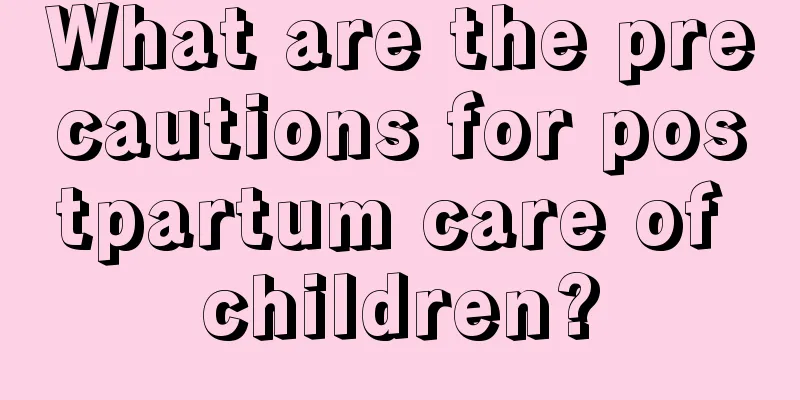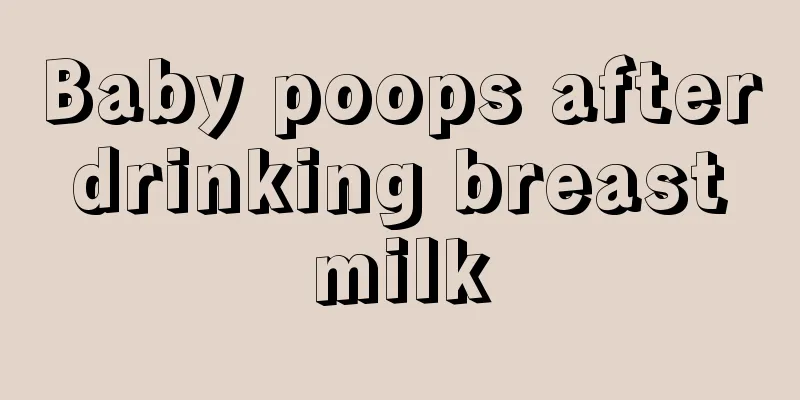What are the precautions for postpartum care of children?

|
Some mothers lack a correct understanding of their children. They need to provide some care for their children as soon as they are born. However, they have never read poetry collections or learned too much knowledge, so they don’t know what precautions to take. Below is my summary of the precautions for child care, I hope it will be helpful to these mothers. 1. Keep warm When examining and caring for newborns, it is important to keep them warm, especially in the cold winter. At 24℃-25℃, the body can maintain normal body temperature through changes in vasoconstriction and vasodilation, without the need to sweat to dissipate heat or accelerate metabolic heat production. This temperature is most beneficial to the health of newborns. 2. Skin care When bathing a newborn, it is advisable to use non-irritating baby soap. After bathing, use a dry and soft towel to absorb the water on the body and apply a little scented powder on the skin wrinkles. Be sure to wipe the buttocks clean with a warm towel after each diaper change. Sometimes the skin on the buttocks becomes red due to irritation from urine, so you can apply a little sterile vegetable oil. 3. Care of the five sense organs Pay attention to the cleanliness of the face, external auditory canal opening, nostrils, etc., but do not dig the external auditory canal and nasal cavity. Because the oral mucosa is delicate and rich in blood vessels, it is very easy to be abraded and cause infection. Therefore, you should not scrub your mouth hard frequently, and you should not use needles, especially unclean needles, to pick and grind the small white spots on the gums - epithelial beads (commonly known as "horse teeth" or "plate teeth"), to prevent bacteria from entering the human body and causing sepsis. 4. Prevent infection When caring for a newborn, pay attention to hygiene and wash your hands before each care to prevent bacteria on your hands from being brought to the newborn's delicate skin and causing infection. If the caregiver suffers from an infectious disease or is a carrier, he or she must not touch the newborn to prevent the newborn from being infected. If a newborn develops an infectious disease, he or she must be strictly isolated and treated, and those who have had contact with him or her must be isolated and observed. Many expectant mothers are at a loss as they have no experience at all, so they don’t know where to start. After my introduction, I believe expectant mothers will have a clear understanding and know the key points of care. Only in this way can we prevent the baby from getting sick and give the baby a healthier body. |
<<: What are the methods of postpartum care and newborn care?
>>: What are the key points of postpartum baby care
Recommend
What to do if your child has poor liver function
If a child's liver function is not good, the ...
What should I do if my child has a runny nose due to a cold?
Because babies' body functions are not fully ...
What to do if your premature baby has a cough
It is quite common for premature babies to have c...
How to adjust the newborn baby's upside-down sleep
Children's sleep is of great significance to ...
3-year-old baby still wets the bed
All parents hope that their babies can grow up he...
Why do newborns yawn all the time?
Yawning is a very common phenomenon. We yawn when...
What is the cause of white spots on children's nails?
The condition of nails can reflect the health of ...
Milk volume for a two-week-old newborn
Every parent hopes that their baby can grow up he...
The child has a blue birthmark, which can be treated with laser
Generally speaking, the most common birthmark on ...
What are the symptoms of poor digestion in children?
It is quite common for children to have poor dige...
Are people with Down syndrome necessarily stupid?
Prenatal check-ups during pregnancy are very impo...
3-year-old baby with allergic rhinitis
Allergic rhinitis is a disease that is neither se...
What are the reasons for children grinding their teeth during the day?
Teeth grinding is also called teeth clenching. Ge...
What are the symptoms of laryngitis in children?
The so-called pediatric laryngitis is the pediatr...
What causes bad breath in a two-year-old baby?
From the time children stop drinking breast milk,...









